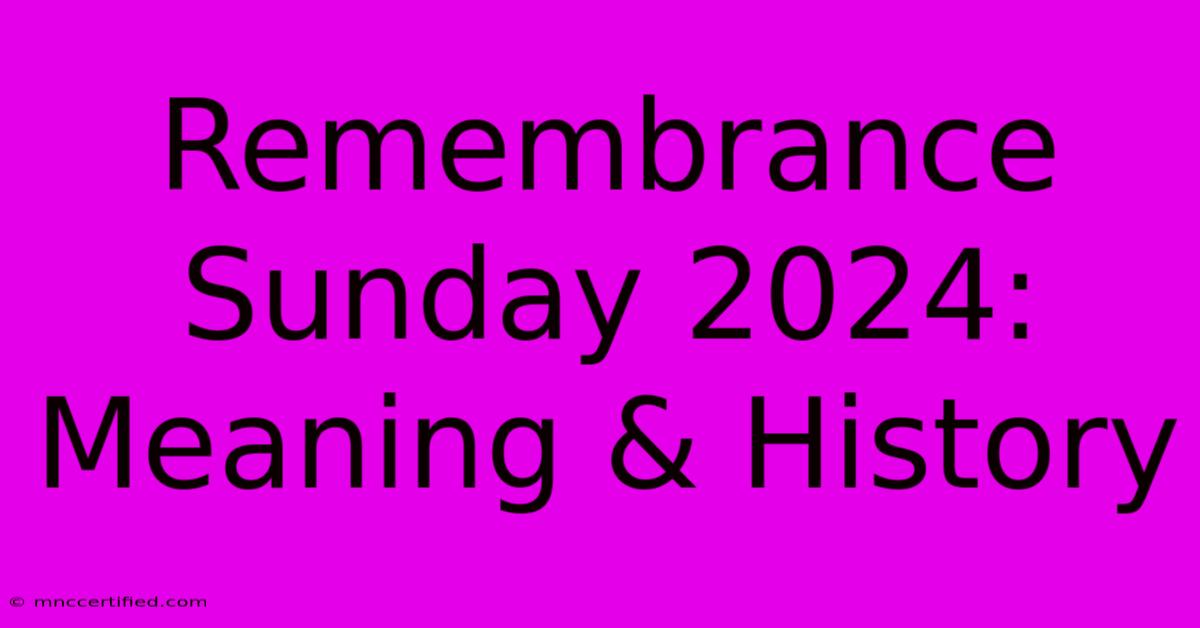Remembrance Sunday 2024: Meaning & History

Table of Contents
Remembrance Sunday 2024: Meaning & History
Remembrance Sunday, also known as Remembrance Day, is a poignant annual event held on the second Sunday of November. In 2024, this day falls on November 10th. This day is dedicated to honoring and remembering those who have died in wars and conflicts, particularly those who served in the British Armed Forces. It's a time for reflection, gratitude, and a collective expression of respect for the sacrifices made by countless individuals.
The Origins of Remembrance Sunday
The origins of Remembrance Sunday can be traced back to the end of World War I. The first Armistice Day was observed on November 11, 1919, marking the first anniversary of the armistice that ended the conflict. The first two minutes of silence were held at 11 am on this day.
In 1921, the King George V officially adopted the name "Armistice Day" and declared it a day of remembrance. It was observed on the eleventh hour of the eleventh day of the eleventh month, commemorating the signing of the armistice agreement at 11 am on November 11, 1918.
In the UK, Armistice Day was later renamed "Remembrance Day" in 1946 and shifted to the second Sunday of November. This change was made to ensure a wider observance as Sunday is a day off for most people.
Meaning and Significance
Remembrance Sunday holds immense significance for individuals and communities across the UK and beyond. It's a day to:
- Honor the fallen: Remember and pay tribute to those who lost their lives serving their country in wars and conflicts.
- Recognize sacrifice: Acknowledge the bravery and sacrifices made by veterans, both those who returned home and those who never did.
- Promote peace: Encourage reflection on the human cost of conflict and promote peace and understanding.
- Show solidarity: Foster a sense of national unity and demonstrate solidarity with those who have been affected by war.
Key Observances and Symbols
Remembrance Sunday is marked by various poignant observances and symbols:
- The Poppy: The poppy, a red flower that grows in war-torn battlefields, has become a universal symbol of remembrance. It is worn on lapels and displayed in homes and public spaces to show respect for those who have died.
- Two-Minute Silence: At 11 am on Remembrance Sunday, a two-minute silence is observed throughout the UK to remember the fallen.
- Remembrance Services: Churches and community centers hold special remembrance services with hymns, prayers, and readings to honor the fallen.
- Parades and Marches: In many towns and cities, parades and marches are held involving veterans, armed forces personnel, and community members. These events often feature marching bands and wreaths laid at war memorials.
- The Cenotaph: The Cenotaph in Whitehall, London, is a prominent war memorial where the Queen and other dignitaries lay wreaths on Remembrance Sunday.
Engaging with Remembrance Sunday
Remembrance Sunday is a day for individuals to engage in meaningful ways:
- Attend a service: Participate in a local remembrance service to show your respect and reflect on the sacrifices made.
- Wear a poppy: Wearing a poppy is a simple but powerful way to show your support for those who have served their country.
- Share stories: Listen to the stories of veterans and share their memories with others.
- Educate children: Teach younger generations about the significance of Remembrance Sunday and the importance of honoring those who have served.
- Support charities: Donate to organizations that support veterans and their families.
Remembrance Sunday serves as a powerful reminder of the human cost of war and the importance of honoring those who have given their lives in service. It's a day to reflect on the past, appreciate the present, and work towards a future where peace prevails.

Thank you for visiting our website wich cover about Remembrance Sunday 2024: Meaning & History . We hope the information provided has been useful to you. Feel free to contact us if you have any questions or need further assistance. See you next time and dont miss to bookmark.
Featured Posts
-
American National Insurance Interview
Nov 10, 2024
-
Bonding On Front Tooth Keeps Breaking
Nov 10, 2024
-
Brighton Vs Man City Premier League Match Recap
Nov 10, 2024
-
Remembrance Festival Review Moving Stories Of War
Nov 10, 2024
-
Wrexhams Mc Clean Stands Alone In Photo
Nov 10, 2024